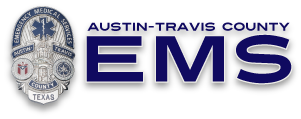Community Health Paramedic Team
Austin-Travis County EMS (ATCEMS) developed the Community Health Paramedic Program (CHP) in 2006. Fifteen years ago, ATCEMS recognized there was a need to develop new ways to serve individuals who call 911 for non-emergent problems or conditions that could be better addressed by other services; their primary care doctor, a mental health professional or urgent care.
That same year the department began investigating ways to work collaboratively with representatives from the hospitals, clinics, mental health agencies and law enforcement. The idea was to assess and develop new ways of providing more individualized and intensive services to reduce the individual’s reliance on the 911 emergency system. This led to the development of many partnerships with various agencies in the community that typically had not partnered with EMS to deliver service. Streamlining communication and collaboration between these agencies was crucial to providing the patient the right care, at the right time, from the right provider. Along the way, the medics identified additional gaps in the healthcare and mental healthcare systems that EMS was strategically positioned to address. This work would be the birth of today's ATCEMS CHP Team.
The CHP Mission is to improve the health equity and healthcare options for underserved and vulnerable populations in Travis County through innovative utilization of the unique skills and talents of our Community Health Paramedics in order to help individuals proactively and preventatively manage their healthcare needs.
Today, the CHP Team has evolved to a group of thirty-two (32) providers and one Commander who work independently to address health related needs and problems of the community. Needs such as taking care of non-emergent medical problems, getting patients set up with a primary care doctor or connecting them to and providing mental health services. CHP team members can often be found working with a variety of health care and social service providers such as social workers, doctors, mid-level practitioners, police officers and case managers providing medical care and assisting patients navigating the health care system.
The overall goal of the CHP is to help people manage their medical and mental health in a proactive manner that keep them from relying on 911. CHP along with services such as Community Care, Integral Care, Central Health and many other organizations work collaboratively to remove barriers to health care.
Every day is different for a CHP Team medic. CHP team members meet with individuals wherever they are; at home, on the streets, at shelters and while incarcerated. Some respond to 911 calls, along with traditional response units, or in place of those units, to provide unique solutions. Others work as Case Managers meeting with patients and clients on a more scheduled basis. While working with the individual, CHP medics assess their physical and mental health, identify essential medical needs and develop a patient care plan focused on addressing the needs of the whole person and getting them the appropriate care.
While carrying out the patient care plan that has been developed, the CHP medic monitors the health of the patient, relaying information to other medical professionals and alerting them of issues that may need to be addressed before they become emergencies, such as a significant change in their physical or mental health. By assuming this role in the community, CHP medics often serve as the “eyes and ears” for other healthcare providers that also want to keep the patient healthy. In some cases, such as opiate users who are ready to begin treatment for their addiction, CHP medics provide immediate medical treatment that is otherwise not available in the healthcare community, and continue the treatments until the patient can be started in a formal treatment program.
Moving forward, the goal is to utilize the Community Health Paramedic Team to address non-emergent needs for individuals who call 911 because they have no other place to turn for medical care or mental health crises. We are also partnering with clinics, hospitals and other resources to develop ways to prevent hospital re-admissions and ensure the patient is receiving the most appropriate care.
CHP medics are well positioned to become the next generation of paramedics and EMT’s that respond to 911 calls, determine the most appropriate care and get them connected to the best possible resource. These resources may not be hospital emergency departments, instead they may be urgent care centers, clinics, telemedicine, or treatment at the point-of-contact with the patient.
Programs provided by CHP include:
High Utilizer Group (HUG) and HUG-Prevention
People Experiencing Homelessness (PEH) Support Program which include:
- Homeless Outreach Street Team (HOST) partnership
- Street Med Collaboration
- Pop-up Resource Clinics (PURCs)
More information about the programs, including eligibility and how to refer someone who may be eligible and in need, is available on the CHP Resource Page.

